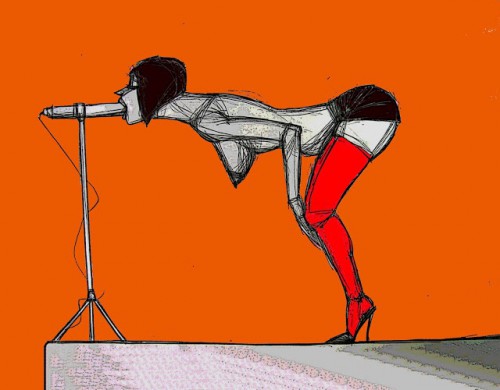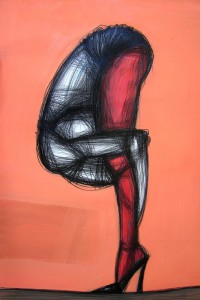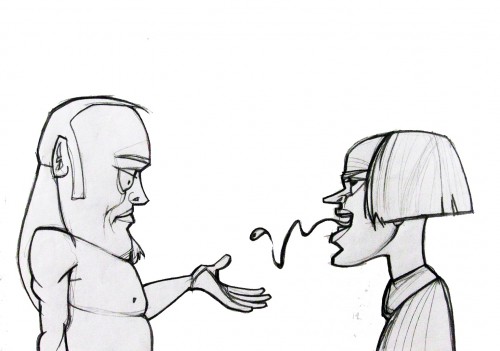Four Cuban Writers Go To Paradise by Carlos Esquivel
by Sampsonia Way / August 9, 2013 / No comments
Translated by Karen González
Nicolasa Guillén, Virgilia Piñera, Regina Pedroso, and Josefa Lezama Lima leave to go to paradise for a week. However, upon getting there they find out that, in fact, they have arrived at the steps of a ramshackle hotel for writers where they must imagine that they’ve arrived at paradise.
- Carlos Esquivel
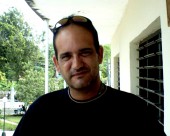
- He is a writer living deep in the far-off provinces, but he is not at all a provincial writer. Indeed, he is one of those writers who have opened his prose and poetry to the cosmopolitan—which in Cuba is quite a gesture of controversial politicization.
Read More.
- The Writer Speaks
- Interview by Norge Céspedes.
- “I care about being provocative, but my first concern is atmosphere. I go for any contamination. That’s the point: To tolerate the challenge of any tradition and to defy that very tradition. There are still topics which I owe to myself. I have a life, or a piece of life, that is stained with, and between, words. There are still many mistakes for me to make.
”
- Karen González
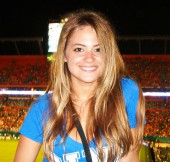
- Born in Holguin, Cuba. Migrated to the United States in 2006.
Attended the University of Florida, where she got her Bachelor’s Degree in International Studies. Karen speaks fluently English, Spanish, and Portuguese. Email her or Follow her on Twitter
In addition, they are forced to pay an astounding amount to stay there, and among the guests sharing paradise with them, there were infamous writers from many countries whom they always intuited to be literary disgraces.
Astonished, they looked at each other. Of course they could not quit. A week would go by quickly in paradise, said Nicolasa, who held the sign of “I am in charge here, and it will be done as I consider prudent.”
Nicolasa Guillén, Virgilia Piñera, Regina Pedroso, and Josefa Lezama Lima stayed in ramshackle rooms, and that night, after a derisory dinner, they received an invitation to a literary gala where they would have to gulp down lectures delivered by several of those other, infamous writers.
Virgilia Piñera said that she would rather have a drink at a nearby bar. Nicolasa could not prevent it, for she too wanted to escape, but could not on account of her simulated officiality. The others, who wanted to demonstrate their fidelity to her under any circumstance, also stayed.
And so they slept pleasantly while their colleagues read somniferous poems.
Pleasantly? No.
While the reading took place, Nicolasa dreamed that in one of the streets of paradise she found a man who ate books by Cuban authors. They taste horrible, the old man said while chewing on a recently published novel. The worst ones are those by Nicolas Guillén, too coarse, as if the most artificial condiment was the author’s very name.
When Nicolasa tried to reprehend the book eater, twist his neck, she woke up with her hands wrapped around the neck of a Costa Rican poet.
Regina Pedroso dreamed that she had committed suicide six times. Without success, or successfully, depending on your point of view. They were eccentric suicides. One of them consisted of living as a regular citizen in her own country. A voice inside the dream rumored that that oneiric episode was too exhausting, that no punishment could prove to be so drastic as that one.
She woke up startled, believing she was in her house, living and dying the suicide as the final punishment of her days. Then, relief ran through her for a few seconds.
Josefa Lezama Lima suffered from horrifying nightmares, night after night. As a result she was wary of those almost incomprehensible limits between dreams and reality. However, her wit had allowed her to create an intermediate point. She would jump from one place to the next with impenitent autonomy. What she could not control was the matter referring to the jump—to the moment of the jump. A moment that could last half a minute or a few hours. In that moment she did not belong to any of the two places. She tried to use her wit to find a way to penetrate those networks but it was impossible. During the jump she wasn’t herself, she didn’t belong anywhere, she didn’t exist.
She later understood that she was both witness and part of one of those very suggestive metaphors in which death surrounds dreams, and she understood that Freud, Borges, or any other, would tremendously envy those sensations that governed her. Then, it would be necessary to understand that Josefa was neither asleep nor awake throughout the literary evening. She was in a place called “jump.”
Upon seeing her friends asleep Virgilia, arriving late, decided, after sitting in one of the last chairs in the theater, to throw herself into the world of dreams like a docile damsel submerging into a docile and fantastic novel.
She did not have any relevant dreams. She dreamed, instead, of flowers. Spectral and asleep, flowers.
Four Cuban writers went to paradise, but paradise was too similar to that which they did not believe was paradise.
Edited in English by Joshua Barnes
__________
All facts and characters appearing in this work are fictitious. Any resemblance to real persons, living or dead, is purely coincidental.
Los hechos y/o personajes de esta historia son ficticios, cualquier semejanza con la realidad es pura coincidencia.
Leer en español
__________

